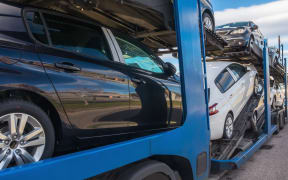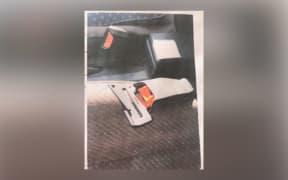The dodgy warrants of fitness saga continues with some truck and bus inspectors now accused of bending or breaking the rules.

There's talk in the industry of rorts revolving around a truck or bus being checked before it goes for a Certificate of Fitness. Photo: 123RF
So far 13 inspectors or garages that issue warrants have been suspended - affecting 20,000 cars.
But no inspectors that do six-monthly heavy vehicle Certificates of Fitness (CoF) checks have been suspended.
However, there's talk in the industry of rorts revolving around a truck or bus being checked before it goes for a CoF - also known as a pre-CoF check.
Pre-CoFs can be useful in the hands of good operators, industry insiders players say, and all the big operators are using them.
But anecdotally there is misuse as well, typically where a pre-CoF finds a fault it gets repaired, then when the inspector does the full CoF they'll only check that repair, not the whole vehicle, as the rules demand.
Vehicle Inspection New Zealand chief executive Gordon Shaw said that doesn't happen at his company, but he had heard of it happening elsewhere, though he would not comment on how widespread it might be.
Mr Shaw said there are serious risks involved if CoFs aren't done properly.
"If we're not doing a full inspection - if you're only doing part of it - well then you may miss faults," he said.
The Motor Industry Association (MIA) had also heard of some inspectors cutting corners.
"I have anecdotally heard that that has happened from time to time," MIA chief executive David Crawford said.
"The way they (truckies) justify it, and I'm not supporting this justification, is to say the pre-CoF basically is 'let's see if it's up to scratch and if it's not we'll indicate the areas we need to'.
"Then when we issue the CoF, because we've already pre-done it, we'll only look at those areas that were not up to scratch, so between the two we've done the whole lot.
"This was a reasonable approach so long as, between the pre-CoF and the CoF, they don't do other things that don't get checked in the full inspection," he said.
It was possible for instance that an unscrupulous operator could put good tyres on for the pre-CoF then swap them out for old tyres for a CoF if they knew that the check would only be partial, Mr Crawford said.
Other anecdotes include:
- Mechanics who aren't authorised to do full CoFs, doing all the pre-CoF checks and repairs, and the authorised CoF inspector only being called in at the end to provide a signature.
- Garages doing 25 full CoFs a day with just one inspector, when there's time to perhaps properly do just eight.
Trucking Association chief executive David Boyce played down the extent of any carryings-on.
"I keep saying 'I don't think there's anything rampant going on'. There's always going to be the odd slip-up with any system," Mr Boyce said.
"If the checks and balances are there, if the regulator is regulating, that shouldn't be an issue."
RNZ pointed out the Transport Agency had admitted to not regulating for years.
"Yeah, correct ... fair call," he said.
The pre-CoF inspections are a perverse outcome of the Transport Agency bringing in a five-star Operator Rating System.
A truckie stands to have a star deducted if they fail a full CoF, so they use the pre-CoF check to lessen that risk.
Veteran vehicle inspector Paul Greenwood said the unforeseen and perverse outcome of the five-star system, in spawning the use of pre-CoFs, was that nearly all vehicles pass their CoF the first time.
This undermined the five-star system as a way of assessing how well vehicles are maintained between Certificates of Fitness checks, he said.
Mr Greenwood wrote to the Transport Agency in early 2017 and to Simon Bridges, the Transport Minister at the time, about this.
"The rating system which is supposed to encourage operators to maintain their vehicles to a better standard, is, in actual fact, doing the opposite. The overall result is a poorer maintained vehicle fleet on the road," he wrote.
Pre-CoFs are very common among the industry - Vehicle Testing New Zealand (VTNZ) calls them a Vehicle Condition Assessment (VCA).
"Once the vehicle has been repaired, it returns to VTNZ for a full CoF inspection,"country manager Greg O'Connor said in a statement.
"Other operators offer a similar service... I cannot comment on their practices, however, it is VTNZ's policy that all vehicles presented for a COF, regardless of whether they have received a VCA or not, undergo a full COF inspection.
"If VTNZ learns of any breaches to this policy within our network, swift action would be taken," Mr O'Connor said.
Another potential weak spot in heavy vehicle testing was outlined by VINZ chief executive Gordon Shaw.
"Up until four years ago VINZ, VTNZ and the AA were the inspectorate for CoF, and the agency allowed other players to enter the market, including trucking firms that wanted to essentially do their own CoF.
"And in my view that is probably problematic," Mr Shaw said.
The truck company had to have a separate company, using NZTA-approved inspectors who had their own individual contract with the agency.
Mr Shaw said this was okay for good operators, but not for poor ones.





